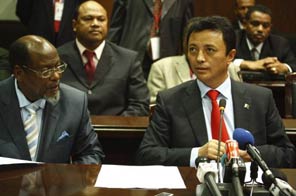Madagascar looks forward after deal
MAPUTO: Madagascar's political rivals wrapped up crisis talks Sunday, after agreeing on a blueprint for a transition government that leads to fresh elections, but leaves the allocation of posts undecided.
The leaders of the island's four main political groups, including ousted president Marc Ravalomanana and his rival Andry Rajoelina, agreed to set up an interim government and hold elections by the end of next year.
"There's practically nothing left to do except to divide the positions and the responsibilities. That's the most difficult," said former Madagascan president Albert Zafy, another participant in the talks held in the Mozambican capital Maputo.
The marathon talks cleared key points of amnesty for Ravalomanana, the structure of a unity transition government, a constitutional referendum, and legislative and presidential elections within 15 months.
But the issue of who will lead the power-sharing government to steer the transition -- headed by a president, vice president, prime minister and three deputy prime ministers -- will await further talks.
"The mediation made an appointment with the leaders to meet them again in Maputo in about 10 days," Tiebele Drame, a member of the United Nations mediation team, told AFP.
The accord is meant to pull Madgascar out of months of crisis following the army-backed rise of Rajoelina and bloody riots in March that left 100 dead and forced Ravolamanana to flee the country.
The parties regrouped briefly on Sunday after signing the power-sharing accord in the early hours of the morning when the fourth day of talks led by Mozambique's former president Joaquim Chissano dragged on overnight.
All previous efforts to reach a negotiated settlement had broken down over a transition charter. The Maputo talks brought Ravolamanana and Rajoelina face-to-face for the first time since the crisis started in Madagascar.
The vast and troubled island nation has faced increasing isolation and seen the bulk of its aid suspended since Rajoelina was handed control by the army which Ravolamanana had entrusted to lead the country.
"I'm satisfied about the outcome of this reunion," said Ravolamanana, who earlier said he will return to Madagascar when "the situation is favourable", after the mediation wrapped up.
Ravalomanana, whose amnesty had bogged down talks, also said he will not personally take part in the political transition but that his party will participate.
"In the interests of the nation, and following consultations, it seems reasonable to me to not participate personally in the transition," he told journalists.
Under the terms of the accord members of the transition government may not run in the elections, except for its president.
The amnesty quashes Ravalomanana's corruption conviction linked to the purchase of a presidential airplane, but does not cover any potential charges relating to war crimes, crimes against humanity, and violations of human rights.
He was sentenced in June after being tried in absentia for a "conflict of interest" in the purchase of a presidential airplane -- a scandal that helped crystalise opposition and led to the rise of Rajoelina.
The dispute between the two rivals has unsettled the country since January, with the mediation involving former leaders Zafy and also Didier Ratsiraka, who are still considered powerbrokers.
Ratsiraka's own amnesty was cleared Thursday. The former president was convicted in 2003 of misusing public funds and threatening state security and sentenced to 10 years of forced labour and five years in prison.
On the streets of Madagascar's capital Antananarivo, people expressed satisfaction with news of the agreement, hoping it will bring an end to the crisis.
"It's a good thing for the people of Madagascar who have been suffering because of the crisis," said accountant Charles Razafindraza, 49.






